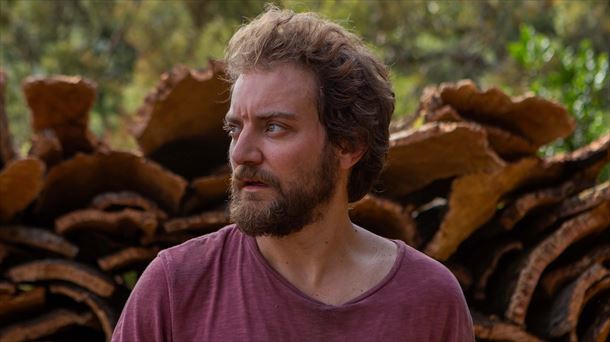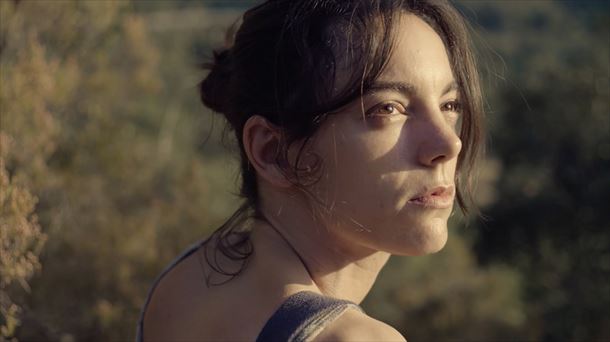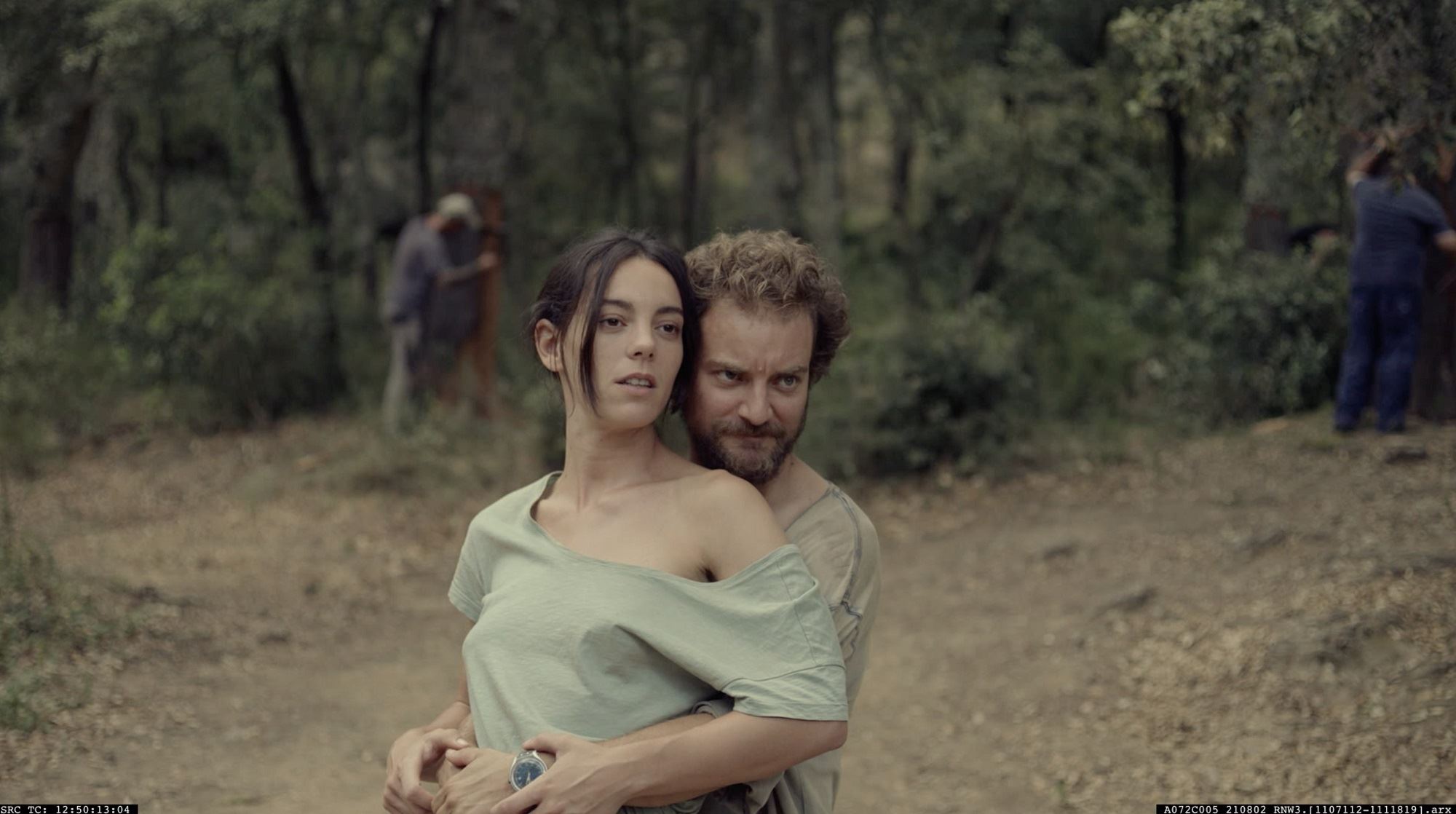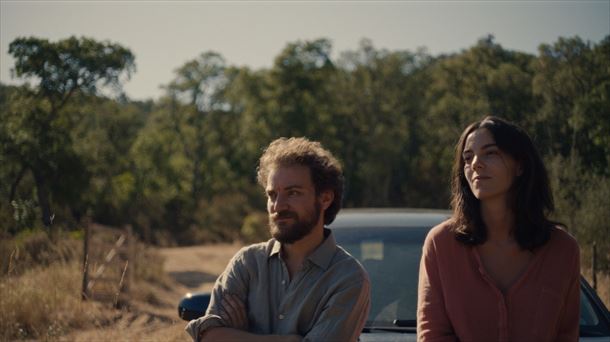Euskaraz irakurri: Mikel Gurrea: “Indifference to the film batek sor dezakeen eratzunik okerrena”
It is not usual for a filmmaker to present their first feature film in the Official Section of the San Sebastian International Film Festival, but surely, in the case of “suro”that surprise and those doubts will dissipate as the film progresses to, surely, disappear at the end of the screening of the first feature film of Mikel Gurrea (San Sebasitán, 1985), shot in Catalan.
Maintaining the style that we could already see in “Heltzear”, his previous subtle, suggestive and attractive short film, Gurrea once again offers the public an endless number of incentives for emotion and reflection on various topics, including isolation, idealism or the place that corresponds to each one in the system.
These claims for thought and agitation reach the big screen thanks to a great technical mastery that flees from artificial embellishment (several surprising transitions are striking), the careful interpretations of the leading couple (Vicky Luengo and Pol López) and a photograph that faithfully and crudely portrays the scene of the action, both its beauty and its ferocity, its roughness and its exudation.
We have spoken with Gurrea about this suggestive film that shows, in addition to many other things, the experiences of a couple who leave the city of Barcelona to create, inhabit and defend a new space around a cork farm in a rural setting.
“Suro” throws a lot of stimuli at the viewer. From where did the movie start to grow in your head?
In 2010, after finishing university in Barcelona, I applied for a scholarship to go abroad, and while it was being accepted, I spent some time not knowing where to go. At that time, through the family of my partner at the time, I found work to do the cork campaign as a seasonal worker.
There I discovered a world whose texture and sound seemed very interesting to me, very cinematographic, and I had mixed feelings: I found work through the owners of the land but I was not a landowner, I speak Catalan but I am not Catalan, I was working but for me it was something temporary… Although at the same time we all had a common goal, to remove as many tons of cork as possible every day.
Therefore, there you found the appropriate setting for the story of Ivan and Helena
Yes, that’s when I thought I would create a movie with such a rich world. Then I went to study in London and so on, and when the time came to think about my first feature film, I was already 32 years old and immersed in a long-term relationship.
At that time we were at the crossroads of deciding how we wanted to live: if we would settle in the city or in a rural environment, if we wanted to have children, if we could live in a more sustainable and fair way… That was the feeling with which I began to write the story of Helena and Iván.

Pol Lopez (‘Suro’)
You have collaborated with Francisco Kosterlitz to write the script. How was the writing process?
Yes, despite the fact that it has a personal origin, it is absolutely a work of fiction that is not autobiographical at all. I began to write the film within the Ikusmira Berria program, doing a series of improvisations with actor Pol López. It was during those sessions that we saw the need to create the character of Helena. It was clear to me that the film had to have two points of view.
Later, Vicky Luengo came in for that role, and when I had already written about four versions of the script, the producers suggested I work with a screenwriter and introduced me to Fran; we connected immediately, we established a very nice relationship and she has done a great job.
Finally, he walked away and I finished the final version.
And that last version also underwent changes during the filming
Yes. Perhaps it should be said that the only ones who have read and followed a script in this film are Vicky Luengo and Pol López. Since the rest of the cast is made up of forest workers who are not professional actors (although Ilyass El Ouahdani has gone that route), I explained the story to them, but they did not read any scripts or have to memorize any scenes.
Therefore, the work was more organic and the writing process continued during the shooting.

Vicky Luengo (‘Suro’)
What does using non-professional actors bring to the shoot, as you did in “Heltzear”?
Speaking of “Heltzear” and “Suro”, in both films there is something very physical, the context of the film is very marked in the characters. For me it was impossible to fictionalize in the case of “Heltzear” the climbing and in the case of “Suro” the work in the forest, and in the case of the non-professional actors who have taken part in the film, the characteristics of their work marked their way of holding the axe, their bodies, their faces and even their way of walking.
In the same way, I have to say Pol López and Vicky Luengo, the protagonists of “Suro”, are “very actors”, both have a long career. And in that clash there was something that was very interesting to me: Helena and Iván arrive from outside, they have internalized some codes, and it seemed to me that this distance could be very interesting, the fact that they break the codes present in the place where they arrive.
Working like this was very nice. Vicky and Pol have worked as if they were the soloists of a jazz band: they could improvise together with the non-professional actors, but then they had to land on the script, which worked as a score.
Luengo and López have therefore borne a lot of weight both in the result of the film, as we have been able to see, and also in the process. What can you tell us about both?
Pol and I are very good friends, he was the protagonist of my first short film, and there was already a mutual relationship. When the movie was just a protoid, I suggested he come and set up a game with me. I am very interested in his ability to reflect a great internal conflict by doing very little. That trait was providential for a character like Iván, to show tension.
In Vicky’s case, she has a giant ability to go from absolute softness to great strength.
The two of them have been very generous from the beginning, since we couldn’t know how the work with the rest of the cast was going to turn out.
You leave a lot of room for the interpretation of the viewer or the viewer, as is evident in the beautiful ending of the film. The story proposes a lot of dilemmas, but there is no artistic decision that directs the viewer. Who do you think of when you make a movie?
I don’t know, I only know what I want to propose to the public, but I don’t know who it is. Ideally, it could be anyone, since I don’t have any audience ratings in my head.
But I like to think that with the film I want to generate something in the viewer, and that “something” is very broad. If it is disagreement, it is already something. The worst thing seems to me to be indifference, seeing the movie and saying “it hasn’t generated anything for me.”
Perhaps that is the cause of my interest not to offer answers, but to bring up questions and reflections. In this film there is a desire for the viewer to decide where they stand in the conflict between Iván and Helena. Some will support Helena, others Ivan, there will be those who jump from one to another and other people will see the film from a certain distance, in a more analytical way.
All of that seems fine to me. The worst possible reaction to a movie would be indifference, that the movie passes someone in front of them without leaving any trace.

Vicky Luengo and Pol López (‘Suro’)
“Suro” is a film as political and social as it is intimate, as local as it is universal. How does this path materialize between the concrete and the general, or perhaps between the general and the concrete?
You can go from the specific to the general, but looking for that is not my way. I start from the smallest detail. At the base of “Suro” is the beauty, the violence and the tension that emerges when the bark of the cork oak is peeled; maybe later that will be amplified, but I am not in any way seeking to carry out a sociological analysis.
In case the film offers the public a possibility to do so, it is welcome, but I do not force the film to do so. I want to think that my work responds to the characters, to that microcosm; if I tried to establish some superstructure above them, it would seem to me that I would be betraying them.
In the film, as in the world, lack of communication is at the bottom of most conflicts, and the silences, so present in the film, are a good example of this. What is causing this general lack of communication?
We are talking about the degradation of a long relationship, and there is fear behind it. Iván and Helena live looking at a projection of the future while they are about to lose the ability to look at themselves in the present.
Maybe if instead of focusing on that projection they would look at each other (or at each other) and ask “how are you?”, it would be better. We do not know what is being told, and, therefore, we cannot treat it.
It is true that their relationship gives off a very powerful energy, very attractive but with a very clear tendency to tension, and that attraction very quickly turns into conflict. In that sense, unfortunately, in your case and in other areas of life, conflict is also a bond and many times breaking a bond is very complicated, because at least you have that bond, no matter how conflictive it may be. I think that’s what’s left for both of them.
Presenting your first feature film in the Official Section of the festival in your hometown is tremendous. Do you think you will experience this edition in a different way?
I would like to be calm and be able to enjoy it, another thing is that I get it, ha ha ha.
I’m going to enjoy it. It will be my first time in many ways, and I want to experience it. It is very exciting to be in the Official Selection of Zinemaldia with my first feature film, I take it with humility and I am very grateful.
There is also a kind of poetic harmony. It makes sense that a film that was born in Ikusmira Berriak premieres in San Sebastian, the circle is closed. Being, moreover, in the city where I was born, my inner circle will also be present, since they are the ones who have lived and suffered the film to the extent that they are my support.
If I am a filmmaker, it is largely because I grew up and was educated in a city where there is an A-rated film festival, because when I was a teenager I was offered a window into the world of cinema, instead of a window.

Pol López and Vicky Luengo
Do you have any other project in hand?
Yes, I am developing projects for a couple of feature films or three, I am quite immersed in that work.
My girlfriend passed me a quote from Roberto Bolaño that I can’t find and that goes something like “who wants to write a story and only starts to write one is stupid, who instead of starting one starts two is also stupid; try to write twelve stories, and maybe you’ll end up finishing one”,
That has been the lesson of “Suro”. Right now I’m developing two or three things, looking at which one takes the fastest speed until I decide which project will be next.
*”Suro”, which has the participation of EITB, will hit theaters in Hego Euskal Herria on December 2, after visiting different international festivals.
Source: Eitb
Mario Twitchell is an accomplished author and journalist, known for his insightful and thought-provoking writing on a wide range of topics including general and opinion. He currently works as a writer at 247 news agency, where he has established himself as a respected voice in the industry.












